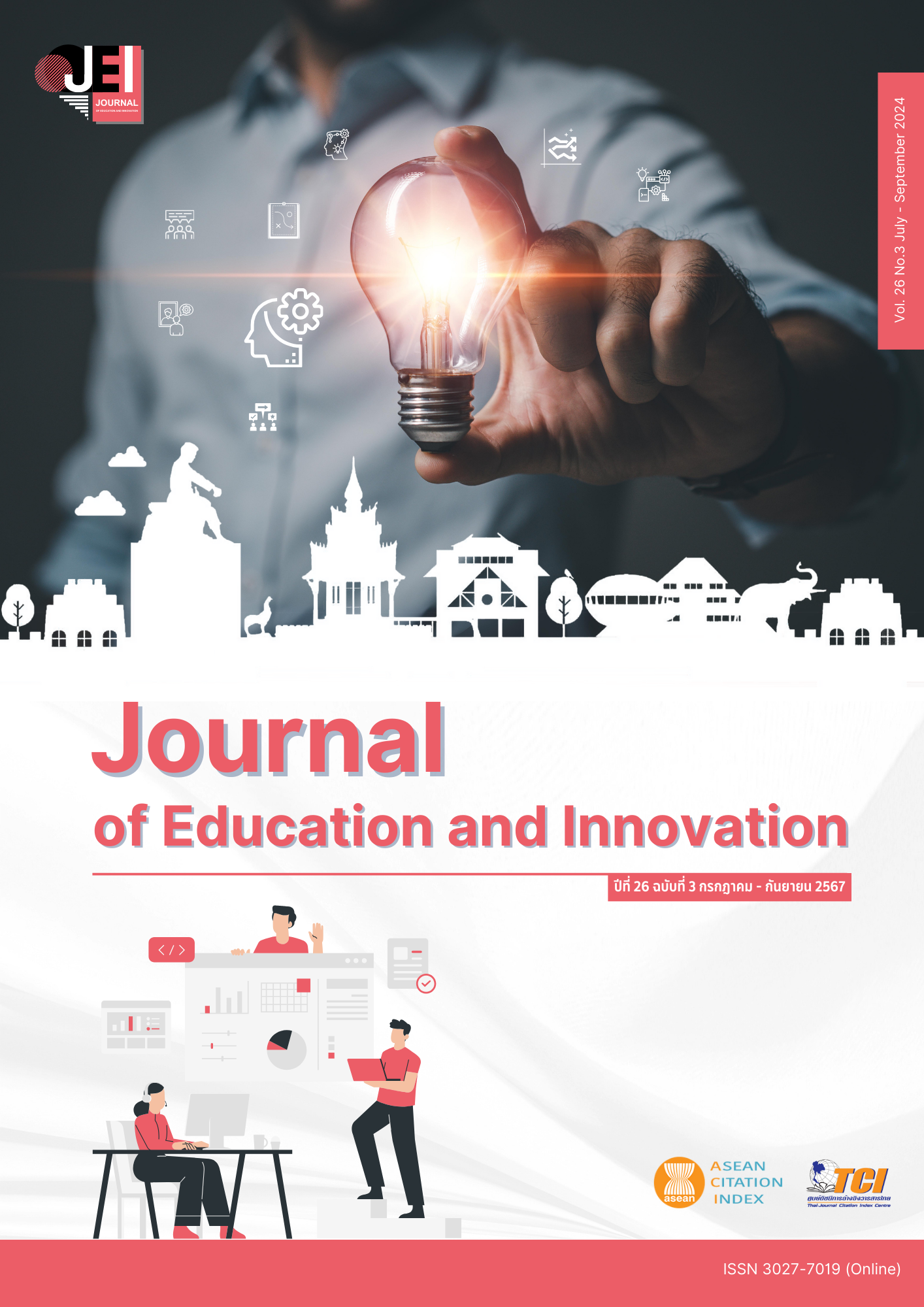AN INNOVATIVE TEACHER PROFESSIONAL DEVELOPMENT FOR LEARNING MANAGEMENT PROMOTING ENVIRONMENTAL SCIENCE LITERACY
Main Article Content
Abstract
This is a multi-phase mixed-method study that aimed to build an innovation for teacher development in learning management that promoted scientific literacy within environmental contexts by 1) exploring teaching and learning situations among 346 teachers in Thailand's Lower North region and then 2) developing the innovation through a collaborative effort involving six teachers and educational personnel. Also, the research included: 3) studying a way of transferring knowledge and experience from the innovation to 117 teachers; and 4) monitoring 12 voluntary teachers’ implementation of the innovation. Research instruments include an online survey, a focus group interview, a workshop evaluation, participant observations, reflective journals, and lesson plans. Mean, percentages, standard deviation, content analysis, and triangulations were used to analyze data, and these indicated that, firstly, their teaching goals incompletely covered scientific literacy, and most of them (>50%) had not had professional development about the literacy. Second, the innovation covers the online workshop with teaching demonstrations that integrate ideas about the Technological Pedagogical Content Knowledge (TPACK) and competencies based on the PISA’s scientific literacy. The innovation is at the highest appropriate level, according to experts’ evaluations. Consequently, the innovative transformation appeared through the online platform, Zoom Meetings, for four days, and the teachers expressed their satisfaction at the highest level of evaluation. Fourth, seventy-five percent of the volunteers adapted the innovation, i.e., learning activities, for their authentic classrooms. Finally, the research recommended further study of the scientific literacy of pre- and in-service teachers to enhance educational quality in science.
Article Details

This work is licensed under a Creative Commons Attribution-NonCommercial-NoDerivatives 4.0 International License.
The owner of the article does not copy or violate any of its copyright. If any copyright infringement occurs or prosecution, in any case, the Editorial Board is not involved in all the rights to the owner of the article to be performed.
References
Boulay, R., Parisky, A., & Leong, P. (2013). Designing Online Resources in Preparation for Authentic Laboratory Experiences. International Journal of Design Education, 6(2), 57-66. Doi: 10.18848/2325-128x/cgp/v06i02/38402
Eze, E., Nwagu, E. K. N., & Onuoha, J. (2022). Nigerian Teachers’ Self-Reported Climate Science Literacy and Expressed Training Needs on Climate Change Concepts: Prospects of Job-Embedded Situative Professional Development. Science Education, 106(6), 1535-1567.
Hanfsting, B., Gnambs, T., Porsch, R., & Jude, N. (2023). Exploring the Association Between Non-Specialised Science Teacher Rates and Student Science Literacy: An Analysis of PISA Data Across 18 Nations. International Journal of Science Education. DOI: 10.1080/09500693.2023.2262729
Karnpukdee, L., Sripahol, S., & Yoelao, D. (2019). Development of Interesting Environment Training Packages Enhance the Environmental Awareness of Primary Students. Journal of Education Research Faculty of Education, Srinakharinwirot University, 14(2), 13-27.
Khiaolueang, W., Kijkuakul, S., & Nakkuntod, M. (2019). Using Science Technology Society and Environment (STSE) Approach to Enhance Environmental Literacy in Human and Environmental Sustainability for Twelfth Grade Students. Journal of Education Naresuan University, 23(2), 257–268.
Koehler, M. J., Mishra, P., Kereluik, K., Shin, T.S., Graham, C. R. (2014). The Technological Pedagogical Content Knowledge Framework. In: Spector, J., Merrill, M., Elen, J., Bishop, M. (eds) Handbook of Research on Educational Communications and Technology. New York, NY: Springer.
Latimer, E., Mandi, A., & Mari, K. (2014). Advancing Teachers of Middle School Science (ATOMS2XP): Connecting Science Teachers through a Statewide Professional Learning Community. International Journal of Adult, Community and Professional Learning, 20(2), 1-12. Doi: 10.18848/2328-6318/CGP/v20i02/48275.
Loucks-Horsley, S., Stiles, K. E., Mundry, S., Love, N., & Hewson, P. W. (2010). Designing Professional Development for Teachers of Science and Mathematics (3rd ed.). Corwin Press.
Office of the Basic Education Commission. (2022). Workshop for the Development of Knowledge in “PISA-Style Online Testing” for Teachers through an Online System. Retrieved December 29, 2022, from https://www.obec.go.th/archives/665652
Office of the National Economic and Social Development Council. (2021). The Thirteenth National Economic and Social Development Plan (2023-2027). Retrieved July 20, 2023, from https://www.nesdc.go.th/article_attach/article_file_ 20230307173518.pdf
Organisation for Economic Co-operation and Development. (2017). PISA 2015 Assessment and Analytical Framework: Science, Reading, Mathematic, Financial Literacy and Collaborative Problem Solving. Paris: OECD Publishing.Organisation for Economic Co-operation and Development. (2019). “PISA 2018 Science Framework”, in PISA 2018 Assessment and Analytical Framework. Paris: OECD Publishing.
Organization for Economic Co-operation and Development. (2023). PISA 2022 Results (Volume I): The State of Learning and Equity in Education. Paris: OECD Publishing.
Owen, D. C., & Sadler, T. D. (2023). Socio-Scientific Issues Instruction for Scientific Literacy: 5E Framing to Enhance Teaching Practice. School Science and Mathematics, 1-8.
Thailand Science Research and Innovation (TSRI). (2021). Plan for Science Research and Innovation 2020-2022 Revision 2022. Bangkok: S.R. Printing Mass Products Limited Company.
The Institute for the Promotion of Teaching Science and Technology (IPST). (2017). Weakness of Thai Educational System. Retrieved June 16, 2022, from https://pisathailand.ipst.ac.th/issue-2017-19/
The Institute for the Promotion of Teaching Science and Technology (IPST). (2018). How do achieved in-service teachers in school system? Retrieved June 16, 2022, from https://pisathailand.ipst.ac.th/issue-2018-35/
United Nations Environment. (2011). Green Jobs: Towards Decent Work in a Sustainable. Low Carbon World. Retrieved July 18, 2021, from https://sustainabledevelopment.un.org/index.php?page=view&type=400&nr=655&menu=1515
Vanichbuncha. K. (1997). Data analysis with SPSS for Windows. Bangkok: Chulalongkorn University.
Walag, A. M. P., Fajardo, M. T. M., Bacarrisas, P. G., & Guimary, F. M. (2022). A Canonical Correlation Analysis of Filipino Science Teachers' Scientific Literacy and Science Teaching Efficacy. International Journal of Instruction, 15(3), 249-266.


